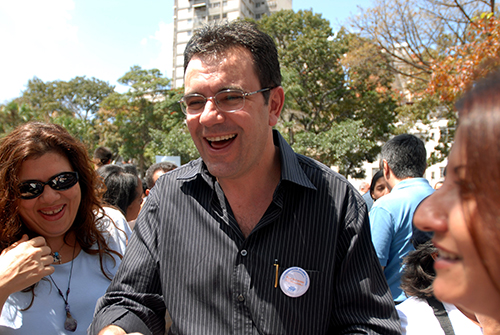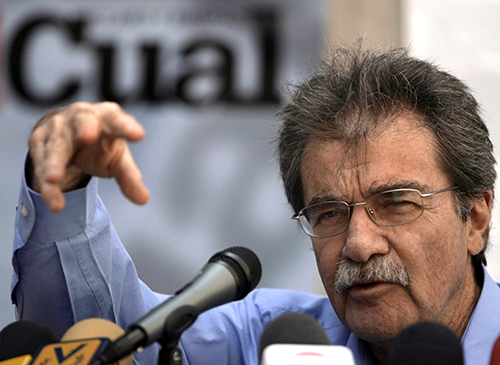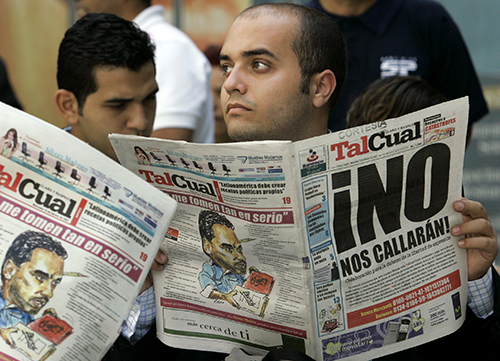Tal Cual, one of the few remaining Venezuelan newspapers critical of the government, is so shorthanded there’s often no receptionist on hand to let people in. Visitors must bang on the front door until someone in the newsroom notices. That can take a while because there are hardly any editors or journalists left.
Facing government lawsuits, spiraling costs, diminishing advertising revenue, and the illness of its founder, the 15-year-old newspaper has downsized in a last-ditch effort to survive. Tal Cual has scaled back its print edition from six days per week to just a single weekend edition and has laid off most staffers. Although it updates stories on its website, the final daily print edition hit the streets on February 27.
“This is a strategic retreat,” news editor Xabier Coscojuela told the Committee to Protect Journalists. “We hope things get better in the future, that the next government will be more tolerant, and that we will return to being a daily newspaper.”
For now, journalists and media analysts say the scaling back of Tal Cual represents another blow to press freedom in Venezuela at a time when a vigorous watchdog news media is more important than ever. The socialist government of President Nicolás Maduro, which is facing an economic crisis and rising social unrest, has been lashing out at critics and jailing opposition leaders. But amid these abuses, most Venezuelan media have become docile and shied away from criticizing the government, said Marianela Balbi, executive director of the Caracas-based Institute for Press and Society (IPYS).
In recent years, independent outlets–such as the Globovisión TV station and El Universal newspaper–have been sold to business groups rumored to be on friendly terms with the government and have toned down their coverage, several Venezuelan journalists told CPJ last year. Most TV and radio stations are either pro-government or rarely question official policies.

Tal Cual, along with El Nacional, was one of the few widely read daily newspapers left in Venezuela that constantly questioned and criticized the government. It was also a must-read for the country’s opinion-makers, said Laureano Márquez, a Venezuelan humorist and Tal Cual columnist who received a CPJ International Press Freedom Award in 2010.
“Tal Cual has always been a stone in the government’s shoe,” Márquez told CPJ.
That stone has become much smaller. Although Tal Cual’s content remains available online, Internet download speeds are slow in Venezuela and many people still prefer their news on paper. And fewer people are producing Tal Cual’s news. The staff has been cut from 40 editors and reporters to about a dozen, Coscojuela said.
During a recent visit, the newsroom was mostly empty chairs and switched-off computers. One of the remaining reporters, Joselyn Torres, told CPJ most of its journalists earn minimum wage and supplement their income by freelancing.
“People are still working here because they like Tal Cual’s journalism,” she said. “And they love Teodoro.”
She was referring to Teodoro Petkoff, a former guerrilla fighter and economy minister who founded Tal Cual in 2000. Now 83 and ill, Petkoff is no longer involved in day-to-day operations. “I’m bedridden,” he told the BBC in February. But for years, Petkoff was the voice of the paper.
Although he leaned to the left, Petkoff had little stomach for the socialist revolution ushered in by the late President Hugo Chávez in 1999. Concerned about Chávez’s military background and authoritarian tendencies, Petkoff denounced what he viewed as the government’s errors and abuses in front-page editorials. But he also criticized opposition politicians for supporting a 2002 coup that briefly ousted Chávez, for promoting a 2003 oil workers’ strike designed to bring down Chávez, and for boycotting the 2005 legislative elections.

Petkoff’s broadsides became a Tal Cual trademark that helped push up daily circulation to 25,000 in the early 2000s, Coscojuela said. But the glory was short-lived. Never very profitable, Tal Cual began losing money as the government nationalized private companies that had advertised in the newspaper then stopped once under state control. Daily circulation has fallen to 8,000 amid Venezuela’s economic crisis while one of the world’s highest inflation rates sent operating costs soaring. Last year, Tal Cual nearly stopped publishing amid a newsprint shortage.
But by far the greatest challenge the paper has faced has been a long-running legal offensive by the Chávez and Maduro governments. In the past decade, Tal Cual has faced seven government lawsuits as well as tax investigations, Coscojuela said.
Márquez, for example, was sued over a 2005 column that consisted of a satirical letter to Chávez’s nine-year-old daughter in which he asked her to tell her father to tone down his behavior. He and the newspaper’s publishing company were found guilty of violating the rights of a child and fined $18,600. Editors and reporters took up a collection to help cover the fine and court costs.
Last year, National Assembly President Diosdado Cabello filed a civil defamation lawsuit against Tal Cual over an opinion piece that republished an erroneous quote from Cabello that was originally published on the Noticiero Digital news site. Tal Cual printed an apology but the lawsuit has gone forward, forcing Petkoff or other board members to show up in court every week. Coscojuela told CPJ that the newspaper expects to lose the lawsuit and get hit with another debilitating fine.
Balbi, of IPYS, said the Maduro administration has put a legal “noose” around the newspaper in an effort to asphyxiate it. IPYS recently produced a video about what it describes as the government’s campaign against Tal Cual, called: “How to pressure a newspaper in six steps.”
Still, Tal Cual remains defiant.
“Tal Cual has no intention of closing its doors,” the newspaper’s board of directors declared in a February communiqué. “If people in the government thought they had defeated Tal Cual, they are wrong.”
